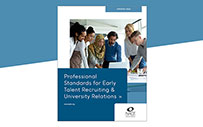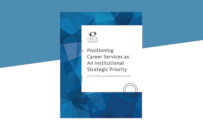
Designed to help NACE members with strategic planning and positioning, the 2025 environmental scan provides a current view of the landscape as it relates to career development and the early career talent recruiting space. The scan includes current demographic data as well as projected data and special survey data of the past year.

Developed by a task force of early talent recruiting and university relations professionals for early talent recruiting and university relations professionals, the Professional Standards offer a roadmap to excellence for programs of all shapes and sizes.

In an ever-evolving landscape, career services needs to adapt and innovate. Here, Hassan Akmal discusses how career services can reimagine itself to meet the needs of students and alumni.

A new $1 million gift supporting career development at William & Mary will triple the number of students annually who can receive university funding for unpaid and underpaid internships.

Career services needs to be strategically positioned on campus to provide the vision, guidance, and relationships to demonstrate its importance and value and to maximize student outcomes.

An employer looking to set up a “campus champion” program as an element in its campus recruiting efforts turned to colleagues in the NACE Community for ideas on staffing, the responsibilities and expectations of the program, and the guidelines for campus engagement.

Qualitative research conducted with 12 markedly different colleges and universities identifies the factors that led to the elevation of the career services operation.

Research shows a greater number of career services units are moving away from their traditional homes in student affairs divisions; this article explores the root causes behind the trend and uses the University of California, Irvine to illustrate what this shift might mean for universities exploring career services realignments on their campuses.

After the pandemic forced major changes to recruitment and talent acquisition, the question of what changes were temporary and which are here to stay remains.

Technology has a place in that future, but whether the tools we use truly promote good or reinforce a damaging status quo depends on the choices we make now.

In this look forward, Shawn VanDerziel, executive director of the National Association of Colleges and Employers, addresses disruptions to our professional lives and the opportunities these present for redefining how college career services and employment professionals operate.

Career work is transformational, not transactional. If an institution clings to the severely outdated myth that universities should " place" students through their career centers, student learning, as well as critical connections with stakeholders, can be lost.